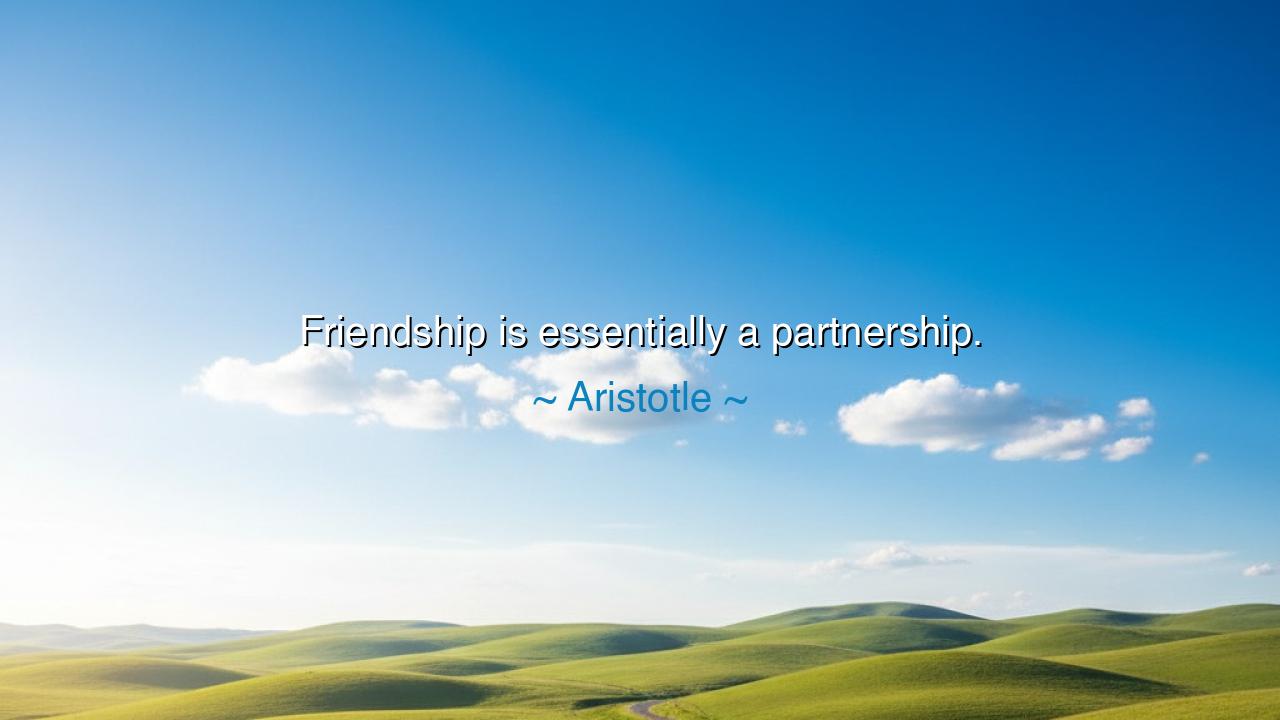
Friendship is essentially a partnership.






"Friendship is essentially a partnership." These words spoken by the great Aristotle reveal the profound depth of friendship—it is not a fleeting emotion, nor a mere casual connection, but a true and lasting partnership built on mutual respect, shared goals, and a commitment to the well-being of one another. Aristotle understood that friendship, at its core, is a cooperative bond, where both individuals contribute their strengths, support each other through trials, and walk alongside each other in the pursuit of shared ideals. It is not a relationship of one-sided giving or taking, but one of balance, where each person’s needs, hopes, and dreams are considered and nurtured.
In the ancient world, the idea of partnership was central to the functioning of society. Plato and Socrates often spoke of the importance of collaboration in the pursuit of virtue and wisdom. But it was Aristotle, in his Nicomachean Ethics, who articulated the idea that friendship was a partnership of the highest order. He saw friendship as a union where each individual must offer something of value—whether it be wisdom, loyalty, or support—to create a bond that is not only sustainable but that leads both individuals toward the greater good. This partnership is founded on virtue, a commitment to excellence, and a shared belief that the other’s happiness and flourishing are as important as one’s own.
Consider the legendary bond between Achilles and Patroclus from the pages of Homer’s Iliad. Their friendship is often spoken of in heroic terms, not just because of their shared battles on the field of war, but because of the partnership they forged in their souls. Achilles, the greatest of the Greek warriors, was not complete without Patroclus by his side. Their relationship was one not only of love and affection but of mutual respect and sacrifice. They were true partners, with each man’s strength and courage bolstering the other’s. When Patroclus was killed in battle, it was not just Achilles’ sorrow that was felt, but the very loss of his partner in the truest sense of the word. This bond, rooted in shared experience, respect, and selflessness, illustrates Aristotle's point that friendship is a partnership—one that relies on the equal and ongoing contributions of both parties.
The idea of partnership in friendship can also be seen in the relationship between David and Jonathan in the Bible. Jonathan, the son of King Saul, and David, the future king of Israel, shared a bond that transcended the politics and conflicts of their time. They supported one another through trials, with Jonathan even risking his life to protect David from his father’s wrath. Their partnership was not based on political gain or personal ambition but on a shared commitment to one another’s well-being. They acted as true partners, offering each other loyalty, understanding, and protection in ways that were profound and enduring. Even when the world around them sought to divide them, their friendship stood as a testament to the strength of their partnership—a partnership rooted not in personal gain but in shared ideals and sacrifice.
Aristotle’s wisdom calls us to recognize that friendship is not merely a collection of pleasant interactions or mutual admiration. It is a partnership that requires both individuals to invest in the other’s success, happiness, and growth. This is a partnership of both hearts and minds, where each individual must give as much as they receive. Friendship, at its highest level, is a union in which each person is committed to the well-being of the other, constantly seeking to uplift, challenge, and encourage. It is a bond where the pursuit of excellence—in character, in action, in virtue—is shared, and where each person holds the other accountable to their highest potential.
The lesson we must take from Aristotle's words is that in our own friendships, we must strive for balance and mutual respect. Friendship should not be seen as an easy, one-sided affair, but as a deep and ongoing partnership. We must offer our loyalty, our support, and our wisdom to those we call friends, just as we expect them to do the same for us. We should encourage each other to grow, to become better, and to rise above the challenges that life places before us. Like the partnerships between Achilles and Patroclus, or David and Jonathan, the greatest friendships are those that push us toward greater virtue and flourishing.
In our modern world, it is easy to fall into the trap of seeing friendship as a mere collection of shared experiences or as a transactional relationship—one that only works as long as it benefits both parties. But Aristotle teaches us that friendship, when it is true, is about mutual commitment to one another’s growth. It is an ongoing, dynamic partnership—one that transcends convenience and seeks to enrich the lives of both individuals. Let us, therefore, seek out and cultivate friendships that are built on the strength of mutual respect, shared purpose, and a commitment to one another’s flourishing. In doing so, we will find that our friendships, like the greatest partnerships, will become pillars of strength, joy, and wisdom throughout our lives.






AAdministratorAdministrator
Welcome, honored guests. Please leave a comment, we will respond soon